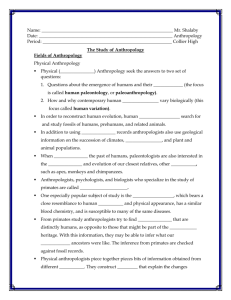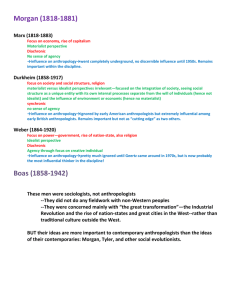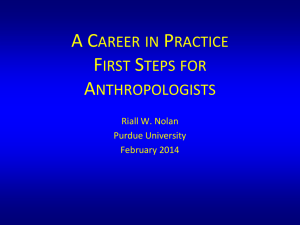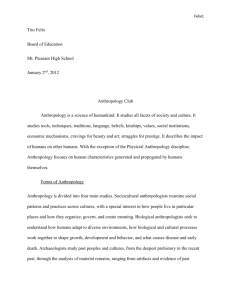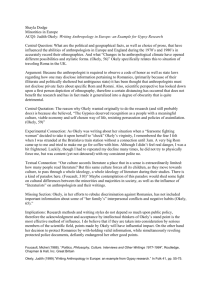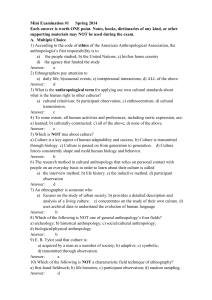What is Anthropology?
advertisement
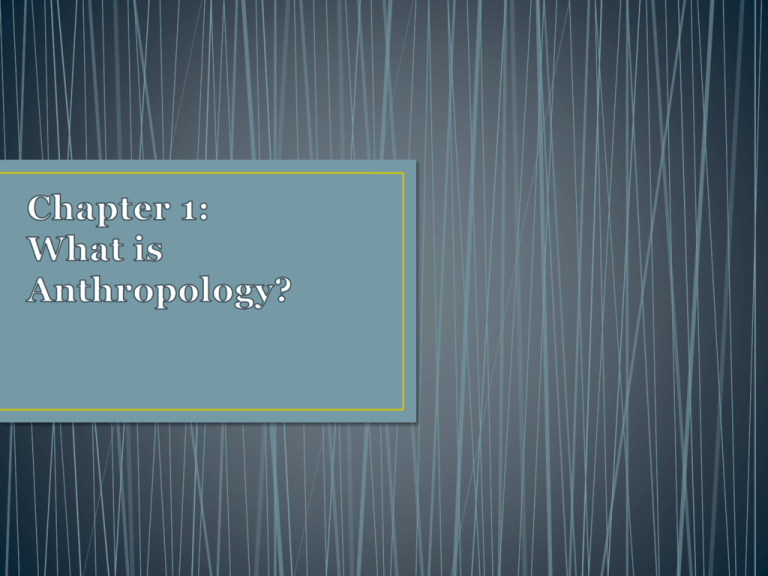
• Anthropology is the study of mankind or human kind. • The term Anthropology comes from the Greek word Anthropos which means “man or human” and logos which means “the study of.” • Anthropologists study various aspects about humans • Anthropology are interested in where, when, and how did humans appear on earth. • How and why they have changed since then. • How and why modern human populations vary in certain physical features. • How and why societies in the past and present have varied in their customary ideas and practices. • Applied and practicing anthropologists put anthropological methods, information, and results to use, in efforts to solve practical problems. • One different between anthropology and other disciplines concerned with humans is that anthropologists travel to study various groups of people or do archeological digs to answer questions about mankind. • Anthropology is concerned explicitly and directly with all varieties of people throughout the world, as well as people from all periods. Beginning with the immediate ancestors of humans. • Anthropologists trace the development of humans until the present. • In the past anthropologists only concentrated on nonwestern cultures, today Anthropologists focus on both. • In addition to the worldwide and historical scope of anthropology, another distinguished feature or its discipline is its holistic, or multifaceted, approach to the study of human beings. • Anthropologists don’t only study all varieties of people but many aspects of the human experience as well. • • • • • • • • the history of the area in which they live, the physical environment, the organization of family life, the general features of their language, their political and economic systems, their religion, their diet, or their styles of art and dress. • In the past, individual anthropologists tried to be holistic and cover all aspects of a subject. Today, so many information has been accumulated, anthropologists start to focus more on one subject or areas. • • • • Physical Anthropology Cultural Anthropology Archeology Anthropological Linguistics • Physical (Biological) Anthropology seek the answers to two set of questions: • Questions about the emergence of humans and their evolution (the focus is called human paleontology, or Paleoanthropology). • How and why contemporary human populations vary biologically (this focus called human variation). • In order to reconstruct human evolution, human paleontologists search for and study fossils of humans, prehumans, and related animals. • In addition to using fossil records anthropologists also use geological information on the succession of climates, environments, and plant and animal populations. • When reconstructing the past of humans, paleontologists are also interested in the behavior and evolution of our closest relatives, other primates, such as apes, monkeys and chimpanzees. • Anthropologists, psychologists, and biologists who specialize in the study of primates are called Primatologists. • One especially popular subject of study is the chimpanzee, which bears a close resemblance to human behavior and physical appearance, has a similar blood chemistry, and is susceptible to many of the same diseases. • Koko the gorilla • https://www.youtube.com/watch?v=480keuakN6c • Koko gets new Kittens • https://www.youtube.com/watch?v=fffuQ6VIOyA • From primates study anthropologists try to find characteristics that are distinctly humans, as opposite to those that might be part of the primate heritage. With this information, they may be able to infer what our prehistoric ancestors were like. The inference from primates are checked against fossil records. • Physical anthropologists piece together pieces bits of information obtained from different sources. They construct theories that explain the changes observed in the fossil record and then attempt to evaluate their theories by checking one kind of evidence against the other. • The second major focus of physical anthropology is the study of human variation, investigating how and why contemporary human populations differ in biological or physical characteristics. • All living people belong to one species, Homo sapiens, for all can successfully interbreed. But there are much variations among human population. • Anthropologists ask questions such as: • Why are some peoples taller than others? • How have human populations adapted physically to their environmental conditions? • Are some peoples, such as Inuit (Eskimos), better equipped than other peoples to endure cold? • Does darker skin pigmentation offer special protection against the tropical sun? • To better understand the biological variations observable among contemporary human populations, biological anthropologists use the principles, concepts, and techniques of at least three other disciplines: • Human genetics: the study of human traits, that are inherited. • Population biology: the study of environmental effects on, and interaction with, population characteristics. • Epidemiology: the study of how and why diseases affect different populations in different ways. • Cultural anthropology are interested in how population or societies vary in their cultural features. • To an anthropologist, the term culture refers to the customary ways of thinking and behaving in a particular population or society. • Archeologists seek to • Reconstruct the daily life and customs of peoples who lived in the past. • Trace cultural changes and to offer possible explanations of those changes. • The different between an archeologist and a historian is that a historian deals only with societies that left written records and limited to the last 5,000 years of human history. Archeologists go much farther back in time. • Archeologists try to reconstruct history from the remains of human cultures. • Most Archeologists deal with prehistory, the time before written records. • To understand how and why life has changed through time in different parts of the world, archeologists collect artifacts. • Linguistics or the study of languages is an older discipline than anthropology, but the earlier linguists concentrated on the study of languages that existed for a long time. • Anthropological linguistics concentrate on the study of languages that has not yet been written. • Because language must be heard in order to be studies, it does not leave any traces once its speakers have died. • Linguists interests in reconstructing the history of unwritten languages must begin in the present, with comparisons of contemporary languages. On the basis of these comparisons, they draw inferences about the kinds of change in language that may have occurred in the past and may account for similarities and differences observed in the present.
